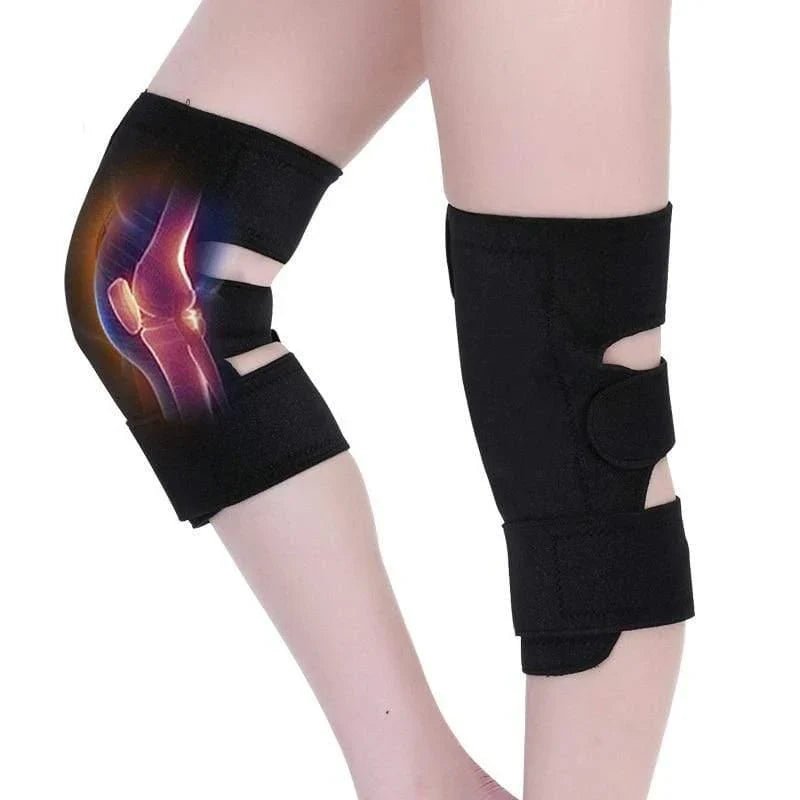If you’ve been dealing with knee pain, injury recovery, or stiffness, you’ve probably wondered:
Should I use a traditional knee brace or a self-heating knee pad?
Both options offer unique benefits — but they work in different ways.
Choosing the right one could mean faster recovery, better comfort, and greater freedom of movement.
Let’s break down everything you need to know about self-heating knee pads versus traditional knee braces so you can make the best choice for your body.
What is a Traditional Knee Brace?
A traditional knee brace is a supportive device made from neoprene, elastic fabric, metal hinges, or plastic frames.
Its main job is to stabilize the knee, limit motion, and protect weakened or injured joints.
You might use a traditional brace if you have:
-
Post-surgical recovery needs
-
Ligament injuries (ACL, MCL tears)
-
Significant knee instability
-
Severe arthritis
Goal: Restrict movement to protect and support the joint.
What are Self-Heating Knee Pads?
Self-heating knee pads look more like lightweight sleeves or wrap-around supports.
They’re made with tourmaline stones and magnetic fibers that:
-
React with body heat
-
Create a mild, soothing warmth
-
Promote circulation and muscle relaxation
Goal: Relieve pain naturally while maintaining flexibility and movement.
Key Differences at a Glance
| Feature | Traditional Knee Brace | Self-Heating Knee Pad |
|---|---|---|
| Purpose | Stability and immobilization | Pain relief and circulation |
| Main Benefit | Joint protection | Muscle relaxation |
| Best For | Post-surgery, ligament tears | Arthritis, joint stiffness, chronic pain |
| Comfort Level | Firm, restrictive | Light, flexible |
| Ease of Use | Moderate | Very easy |
| Portability | Bulky | Lightweight, discreet |
| Extra Features | Hinges, adjustable straps | Self-heating, magnetic therapy |
When to Choose a Traditional Knee Brace
You should go with a traditional knee brace if:
-
You need serious support after surgery or injury.
-
Your knee feels unstable and might give out.
-
You have a diagnosed ligament tear or serious cartilage damage.
Traditional braces are excellent for protecting weakened knees during recovery.
Important:
Always consult with your orthopedic specialist before using heavy-duty braces. Overuse can sometimes weaken muscles.
When to Choose a Self-Heating Knee Pad
You should choose a self-heating knee pad if:
-
You experience chronic knee pain or stiffness.
-
You want drug-free, natural pain relief.
-
You suffer from arthritis, rheumatism, or joint inflammation.
-
You want daily comfort without bulky gear.
Self-heating pads are perfect for ongoing therapy, active recovery, and preventative care.
Bonus:
They’re also excellent for cold climates when joints tend to ache more.
Pros and Cons of Each Option
Self-Heating Knee Pads
✅ Natural heat therapy
✅ Boosts circulation
✅ Lightweight and portable
✅ Comfortable for all-day wear
✅ Affordable and reusable
❌ May not provide enough support for major injuries
❌ Some people may feel excessive heat (always monitor skin)
Traditional Knee Braces
✅ Strong stability and protection
✅ Ideal for post-operative recovery
✅ Protects against ligament strain during sports
❌ Can feel bulky or restrictive
❌ Not designed for everyday pain management
❌ Often expensive (especially custom-fitted braces)
Best of Both Worlds: Can You Use Them Together?
Yes!
Some people use self-heating knee pads daily for pain management and comfort, while switching to a traditional knee brace when needed for sports or injury recovery.
Think of it like having sneakers for daily walks and hiking boots for serious trails — different tools for different tasks.
Real-Life Testimonials
“I used a heavy brace after ACL surgery, but now I rely on self-heating pads for daily comfort. They keep me pain-free without feeling restricted.” — Jenna M.
“Traditional braces helped stabilize my knee after an accident, but for arthritis, self-heating pads are much better. They feel like a warm hug on my joints!” — Mark T.
FAQs About Self-Heating Knee Pads and Traditional Braces
Q: Can I wear self-heating knee pads all day?
A: Yes, just monitor for skin sensitivity. They are designed for flexible, all-day comfort.
Q: Can self-heating pads replace a traditional brace after surgery?
A: No. For post-surgical recovery, follow your doctor’s advice and use a traditional brace until cleared for lighter support.
Q: How long do self-heating knee pads last?
A: With proper care, several months to a year or more. Always hand wash and air dry for best results.
Q: Do self-heating pads really get warm without batteries?
A: Yes! Tourmaline and magnetic materials naturally create warmth through contact with body heat and moisture.
Final Thoughts
Both traditional knee braces and self-heating knee pads have important roles to play in joint health and pain management.
Choosing the right one depends on your needs:
-
Need strong protection? Go for a traditional brace.
-
Want daily comfort, pain relief, and mobility? Choose self-heating knee pads.
Or better yet — have both in your toolkit for complete knee care!
👉 Give your knees the comfort and support they deserve! Shop our best-selling Self-Heating Knee Pads today and experience natural, soothing relief with every step.

